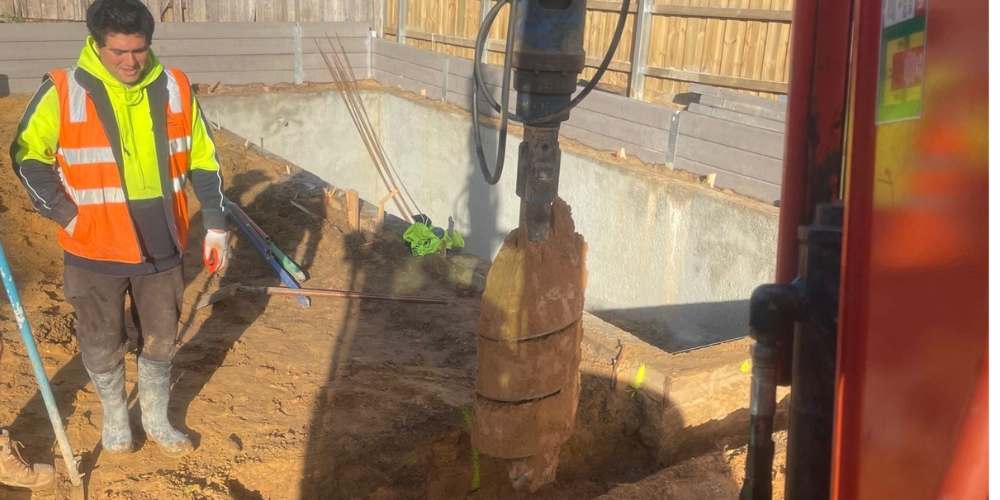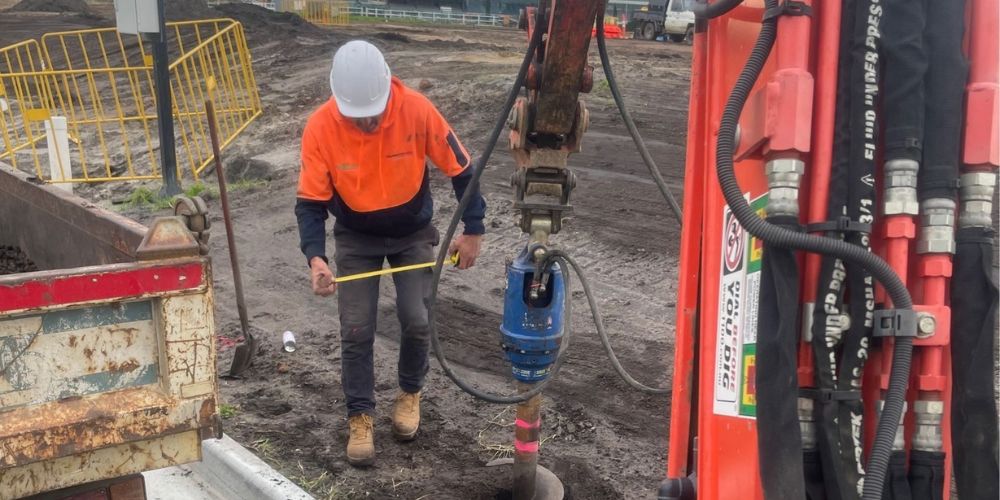How to Choose the Right Earth Works Contractor for Your Project?
Earthworks projects are one of the most involved and important components of building and development, laying the groundwork for a successful venture. Choosing the correct earthworks contractor becomes a critical option when embarking on such a project, as it may considerably impact the project’s result, efficiency, and overall success.
When it comes to earthworks, the contractor you choose is like the captain of a ship – they guide the whole operation. What they do with the land can make or break your project. That’s why we’re here to help you understand the ins and outs of picking the best contractor for your job.
Read on as we uncover the secrets to finding the ideal earth works contractor for your project.

What is an Earth Works Project?
An earthworks project is the process of altering a piece of land’s terrain by engineering to make it appropriate for construction, landscaping, or other types of development. Assume you own a parcel of land on which you intend to construct a home, a road, or a park. However, the land may differ from what you planned to use initially.
This is where earthworks can help. These projects include a series of tasks to modify the land to provide a sturdy and well-prepared foundation for whatever you intend to build.
An earthworks project includes molding and changing an area of land’s natural terrain to prepare it for development or building. It is comparable to preparing a piece of land for a building or other buildings. Digging, moving dirt, leveling the land, forming slopes, and laying foundations are a few examples of these kinds of jobs. Consider it as the preparatory work required before any building can start. Earthworks projects are crucial because they offer a secure and reliable foundation for buildings, roadways, and other structures.
Importance of an Earth Works Project
The importance of an earthworks project cannot be emphasized, as it serves as the basis for successful building and development initiatives. Here’s why earthworks are so important:
Creating a Solid Foundation
The land must be adequately prepared before construction to create a sturdy and safe foundation. Earthworks guarantee that the earth is leveled, compacted, and shaped suitably to withstand the weight and load of the buildings that will be built on it. This foundation is critical to the construction’s safety and lifespan.
Integrity of the Structure
Proper earthworks avoid concerns such as building settlement, subsidence, and uneven settling over time. Earthworks help distribute weight and stress more evenly by carefully modifying the soil and contours of the ground, lowering the danger of future structural difficulties.
Control of Erosion and Drainage
Earthworks are critical in the design and implementation of successful drainage systems. Earthworks assist in regulating rainfall runoff and reduce the danger of floods by modifying the terrain to control water flow and avoid erosion. This is critical for the stability of the building site and the adjacent communities.
Infrastructure Development
Infrastructure projects such as bridges, roads, and utility installations begin with earthworks. Grading, excavation, and compaction guarantee that these projects are built on firm ground, enhancing their safety and lifespan.
Considerations for the Environment
Earthworks can also have a good influence on the environment. Properly planned earthworks can aid in reclamation, such as recovering regions impacted by mining or other land disturbances. Furthermore, well-designed Earthworks may contribute to landscaping that promotes biodiversity and local ecosystems.
Cost-effectiveness
Investing in good Earthworks from the start might save you a lot of money in the long term. Avoiding problems like foundation collapse, water damage, and soil erosion will save you money in the long run.
Saving Time
A well-executed Earthworks project lays the groundwork for more efficient building procedures. When the land is adequately prepared, it avoids building delays caused by unanticipated problems.
Aesthetic Value
Earthworks also influence the aesthetics of a project. Using proper grading and shaping may improve a development’s overall aesthetic appeal, making it more appealing to inhabitants, visitors, and consumers.

Key Factors to Consider When Choosing an Earth Works Contractor
There are different factors to consider when selecting an earthworks contractor for your project to ensure the success and quality of the job. Here are seven critical points to remember:
Expertise and Experience
Choosing an experienced contractor is like having an ace up your sleeve. When they’ve been in the game for a while, it indicates they’ve dealt with various dirt, used various equipment, and overcome unanticipated obstacles. This experience teaches them what works and doesn’t, allowing them to plan and troubleshoot more effectively. A reputable contractor will approach your job with confidence and knowledge, helping the process go more smoothly.
Reputation and References
Checking the contractor’s reputation is similar to reading internet reviews before purchasing something. Online evaluations and client feedback give useful information about how well they’ve previously worked. But don’t stop there—contact the contractor and inquire about referrals from prior jobs. Speaking with prior clients can give you a more accurate impression of their job quality, dependability, and communication abilities. A contractor with a long list of pleased customers is a good bet.
License and Insurance
Making sure the contractor is licensed and insured ensures that everything is legal. A valid license indicates that they have satisfied the legal criteria to operate in your location, providing peace of mind that they are authentic. Insurance is essential if something goes wrong, such as equipment damage or an accident during the project. It protects both you and the contractor from costly surprises.
Equipment and Technology
Think of it like having the appropriate tools for a larger-scale DIY project. Specialized, capable equipment is required for earthworks. The correct tool for the job is equivalent to having current, well-maintained equipment if the contractor has it. This implies that they can operate more productively and deliver higher-quality outcomes. Additionally, contemporary equipment frequently has cutting-edge features that can improve accuracy and safety.
Safety Measures
As with using a seatbelt while driving, safety should come first. A contractor’s dedication to safety is a sign of their professionalism and care for your property and their employees. Inquire about their safety procedures and training initiatives. A contractor is more likely to provide a safe working environment and minimize the risk of accidents or injuries if they invest in safety measures and adhere to industry laws.
Project Management
Managing a project involves coordinating every aspect to ensure everything goes according to plan. Ask a contractor about their project management strategy while speaking with them. How do they intend to distribute resources, organize various activities, and provide you updates? A well-organized contractor will keep the job on schedule and under budget, saving you time, money, and stress.
Environmental Considerations
Choosing a contractor concerned about reducing earthworks’ environmental impact is important. A contractor concerned about the environment is informed about the laws governing soil erosion, water runoff, and other environmental issues. They support a project conclusion that is more ethical and sustainable by implementing strategies that minimize harm to the ecology.
Bonus tips:
Ask Around
To choose the right earthwork contractor, ask for recommendations from your network and check reviews and portfolios. Ask questions to get a sense of their work ethic and professionalism. Research can help you avoid unreliable or over-bidding contractors and make an informed decision.
Get Multiple Quotes
To choose the right Earthwork Contractor for your project, it is important to get multiple quotes, compare prices, reviews, and estimates, ask questions, and evaluate their services and safety priorities.
Review the Contract Thoroughly
The contract for earthworks should clearly state the scope of work, timeline and deadlines, cost breakdown, change order process, materials and specifications, insurance and liability, permits and approvals, termination clause, dispute resolution, warranty, and guarantees, and should be signed by both parties.
Frequently Asked Questions
Safety practices, training programs, and compliance with industry safety regulations should all be in place for the contractor. Examine safety equipment, procedures for dangerous environments, and a commitment to risk reduction.
Yes, however, you must adhere to the change order procedure provided in the contract. Any modifications should be documented and authorized and may need changes to the timeframe and budget.
Choose a contractor who understands environmental standards and follows sustainable methods. This might involve erosion prevention, garbage disposal, and limiting harm to the ecosystem.
The contract should specify how disputes will be resolved. Before escalating the situation, it’s always a good idea to discuss it honestly with the contractor and seek a settlement.
Conclusion
Choosing the best Earthwork Contractor should not be done carelessly. It’s similar to choosing a critical puzzle piece for your construction problem. Conducting a thorough study, asking appropriate questions, and carefully weighing your alternatives will provide positive outcomes.
Remember that this partnership goes beyond construction—it’s about assuring safety, fulfilling deadlines, and sticking to budgets. Keep the momentum rolling once you’ve decided on a contractor. Examine contract details, validate licenses and insurance, and keep in touch long after completing the job. This thorough approach provides the groundwork for a successful project and valued long-term cooperation.
